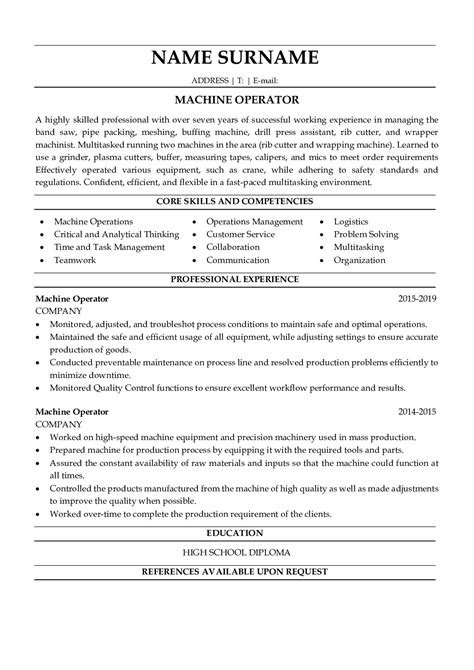Enhance machine operators’ skills, technical proficiency, equipment efficiency, and safety protocols to improve productivity and safety in manufacturing and industrial environments.Are you looking to enhance your career as a machine operator? Whether you’re just starting out in the industry or looking to advance to a higher position, having the right skills is crucial for success. In this blog post, we’ll explore the key skills that every machine operator should possess, how to develop technical proficiency in operating different equipment, ways to improve operational efficiency, and the importance of enhancing safety protocols in the workplace. By gaining a deeper understanding of these key areas, you’ll be better equipped to excel in your role and stand out to potential employers. So, let’s dive in and discover how you can elevate your resume with the essential skills needed to thrive as a machine operator.
Key Skills for Machine Operators
Key Skills for Machine Operators
As a machine operator, it is essential to have a wide range of skills to efficiently operate various types of equipment. One of the key skills that a machine operator should possess is technical proficiency. This includes the ability to read and understand technical manuals, troubleshoot equipment issues, and perform routine maintenance tasks. A machine operator should also have a strong understanding of safety protocols to ensure the safety of themselves and others in the workplace.
Another important skill for a machine operator is the ability to maximize equipment operation efficiency. This involves having a good understanding of the equipment being operated, as well as the ability to make adjustments to optimize performance. Additionally, a machine operator should be able to troubleshoot and problem-solve in real-time to minimize downtime and ensure continuous production.
In addition to technical and operational skills, a machine operator should also possess communication and teamwork skills. They must be able to effectively communicate with other team members, supervisors, and maintenance staff to ensure smooth operations. Being able to work collaboratively within a team environment is essential for success as a machine operator.
Developing Technical Proficiency
Developing technical proficiency as a machine operator is crucial for ensuring smooth and efficient operation of equipment. One key skill for this is knowledge of machine specifications and functionalities. Operators must have a deep understanding of how each machine works, including its components and potential malfunctions. This knowledge allows them to quickly troubleshoot issues and minimize downtime.
Another important aspect of developing technical proficiency is regular training and upskilling. Technology in the manufacturing industry is constantly evolving, and operators need to keep up with the latest advancements. This could involve attending workshops, seminars, or enrolling in courses that cover new equipment and processes. Continuous learning is essential for staying ahead in the field.
In addition, practical experience and hands-on practice play a vital role in improving technical proficiency as a machine operator. Time spent working directly with different machines and tools helps operators gain valuable insights and techniques that cannot be learned from textbooks alone. Practice allows them to develop muscle memory and refine their operational skills, leading to increased efficiency and accuracy.
Improving Equipment Operation Efficiency
Improving equipment operation efficiency is an essential skill for machine operators. Efficiency in operating machinery not only leads to increased productivity but also plays a crucial role in reducing operational costs. Machine operators can improve equipment operation efficiency by regularly conducting maintenance checks and ensuring that the machinery is in optimal condition. By properly maintaining and monitoring the equipment, operators can minimize the risk of breakdowns and downtime, ultimately leading to improved operational efficiency.
Another way to enhance equipment operation efficiency is through continuous training and education. Technical proficiency is indispensable for machine operators, and by investing in skill development programs, operators can stay updated with the latest advancements in machinery technology. Training sessions can also provide them with the knowledge and expertise to operate equipment more efficiently, leading to improved overall performance.
Additionally, implementing safety protocols is crucial for improving equipment operation efficiency. Ensuring that operators are well-versed in safety measures and guidelines can significantly reduce accidents and machine downtime due to mishaps. By creating a culture of safety and enforcing strict protocols, machine operators can focus on their tasks with minimal distractions, thereby enhancing the overall efficiency of equipment operation.
Enhancing Safety Protocols
When it comes to machine operation, safety should always be the top priority. Enhancing safety protocols not only protects the well-being of the machine operators, but also ensures the smooth and efficient operation of the equipment. One of the key ways to enhance safety protocols is to provide comprehensive training for the machine operators. Proper training on the use of personal protective equipment, safe operating procedures, and emergency protocols can significantly reduce the risk of accidents and injuries in the workplace.
Another important aspect of enhancing safety protocols is to regularly conduct equipment maintenance and inspections. Well-maintained machines are less likely to malfunction or cause accidents. Implementing a strict maintenance schedule and performing routine inspections on the equipment can help identify and address potential safety hazards before they become a serious issue.
Furthermore, creating a culture of safety within the workplace can greatly contribute to enhancing safety protocols. Encouraging open communication about safety concerns, promoting reporting of near-misses, and actively involving machine operators in safety improvement initiatives can foster a safety-conscious environment. Additionally, providing incentives for adhering to safety protocols and actively participating in safety programs can motivate machine operators to prioritize safety in their daily operations.
